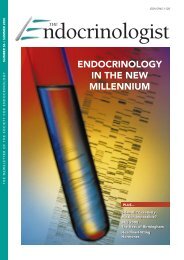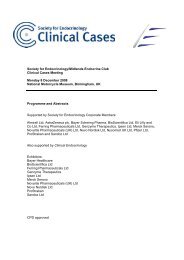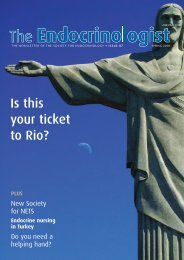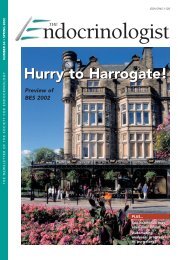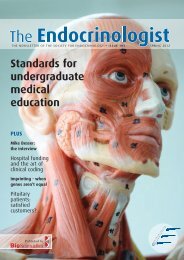Download issue 100 (pdf) - Society for Endocrinology
Download issue 100 (pdf) - Society for Endocrinology
Download issue 100 (pdf) - Society for Endocrinology
You also want an ePaper? Increase the reach of your titles
YUMPU automatically turns print PDFs into web optimized ePapers that Google loves.
A day in the life of a<br />
Nigerian endocrinologist<br />
The founding fathers<br />
The practice of endocrinology as a<br />
specialty in Nigeria dates back to the<br />
1950s. The founding fathers (Professors T Johnson,<br />
O L Ekpechi, J Oli, and B K Adadevoh) trained under<br />
the British system and returned home to found<br />
endocrinology units in institutions across the country,<br />
mainly in Southern Nigeria. In those days they could<br />
boast of well equipped laboratories and laboratory<br />
personnel. They carried out a lot of pioneering work,<br />
especially in the areas of diabetes and thyroidology, even<br />
though these endocrine disorders were considered rare.<br />
Nigerian endocrinology today<br />
Nigeria currently boasts of some 80–<strong>100</strong> clinical and basic<br />
endocrinologists (including trainees) spread over the<br />
country. Training is carried out in the universities and<br />
affiliated university teaching hospitals, and certification is<br />
provided by the West African and Nigerian National Post<br />
Graduate Medical Colleges. The Nigerian <strong>Society</strong> <strong>for</strong><br />
<strong>Endocrinology</strong> & Metabolism (NSEM) is the professional<br />
body that brings together all practising endocrinologists<br />
in Nigeria.<br />
I work with the Obafemi Awolowo University, Ile-Ife, South<br />
West Nigeria. Universities are the main employer of most<br />
Nigerian endocrinologists, though a few have their own<br />
practices. Being employed by the university implies that<br />
your responsibilities and duties will be three-pronged: first<br />
is that you’ll teach both undergraduate and post graduate<br />
students, second is research, and third is your clinical duty,<br />
which is done in your capacity as a consultant to the<br />
university teaching hospital. This multiplicity of roles leaves<br />
the physician with little or no spare time!<br />
Wednesday's child is full of woe<br />
In an attempt to fulfil these roles, my schedule varies<br />
from day to day, but there are instances in which I find<br />
myself being everything in a 24 hour period. I will<br />
describe one such day, my Wednesdays. A typical<br />
Wednesday begins with a drive down to Ilesa, a 30minute<br />
journey to the east of Ile-Ife, where the University<br />
Teaching Hospital has another tertiary referral facility. I<br />
join the residents, interns and medical students to review<br />
the previous night’s admissions in the hospital cafeteria,<br />
which also doubles as our meeting room. Particular cases<br />
and <strong>issue</strong>s discussed at this <strong>for</strong>um span all the various<br />
specialties of internal medicine and are often medical<br />
emergencies such as acute metabolic complications of<br />
diabetes, cerebrovascular disease, acute severe asthma,<br />
and heart failure to name but a few.<br />
With the admission review complete the team now splits<br />
into two: one arm comprising the senior registrar, registrar<br />
and a few interns leave immediately to begin attending to<br />
patients in the endocrinology clinic, while I lead the other<br />
arm to conduct a one hour problem-solving ward round.<br />
We are often confronted with <strong>issue</strong>s such as uncontrolled<br />
blood glucose owing to a patient’s inability to procure<br />
insulin and other medications, diagnostic dilemmas<br />
occasioned not by the inability to identify clinical signs and<br />
symptoms, but by a lack of infrastructure (especially<br />
laboratory and radiological facilities) to pursue such<br />
cases to logical conclusions. A typical example is a<br />
patient with a suspected pituitary tumour requiring<br />
MRI or sophisticated hormonal assays. When absolutely<br />
necessary, patients have to travel several kilometres to<br />
have such tests done in Lagos, Nigeria’s commercial<br />
capital; of course the poor often cannot af<strong>for</strong>d the trip.<br />
At other times, even when a diagnosis has been made,<br />
a definite management plan cannot be instituted because of<br />
the absence of trained personnel or treatment infrastructure.<br />
Complex neurosurgical procedures fall into this category.<br />
United we stand<br />
Later, the whole team combines again in the<br />
endocrinology outpatients’ clinic to attend to over <strong>100</strong><br />
waiting patients, most of whom have diabetes mellitus.<br />
Just as on the ward, we are confronted by glucose control<br />
<strong>issue</strong>s and the consequences: the diabetic foot,<br />
neuropathies, cardiac disease, eye and kidney<br />
complications. The majority of our thyroid disease<br />
patients have either Graves’ disease or toxic multinodular<br />
goitre. They are mostly treated medically, and radio<br />
iodine treatment has also become available at the<br />
neighbouring University College Hospital, Ibadan. Most of<br />
the simple goitres are referred to the surgeons from the<br />
General Outpatients Department. Clinics continue well<br />
into the afternoon with the consultant sharing his stuffy<br />
consulting room with a battery of students and interns.<br />
My working day continues thereafter on the university<br />
campus where I attend to other academic and research<br />
matters, and the inevitable administrative burden.<br />
By and large, endocrinology in Nigeria is rewarding given<br />
our successes in reducing the morbidity and mortality<br />
attributable to endocrine disorders, though these successes<br />
require great ef<strong>for</strong>t given the competition <strong>for</strong> government<br />
funding presented by other medical areas – particularly<br />
infection and other communicable diseases. The dearth of<br />
basic infrastructure and personnel with attendant late<br />
diagnosis and suboptimal treatment<br />
outcomes also do not help matters. It<br />
is hoped that our fledgling health<br />
insurance system and the much<br />
anticipated transfer of technology will<br />
help ameliorate these challenges.<br />
BABATOPE A KOLAWOLE<br />
Senior Lecturer and Consultant Physician,<br />
Department of Medicine,<br />
Obafemi Awolowo University, Ile-Ife, Nigeria<br />
T H E E N D O C R I N O L O G I S T • I S S U E 1 0 0 • S U M M E R 2 0 1 1<br />
15<br />
FEATURES<br />
Costus<br />
spectabilis,<br />
the national<br />
flower of<br />
Nigeria.<br />
IMAGE COURTESY OF<br />
JACOB ULUWEHI KNECT<br />
The editorial team are<br />
keen to hear from other<br />
overseas members’<br />
who wish to give us a<br />
snap-shot into the<br />
endocrine scene in their<br />
country. Get in touch<br />
with Andrew Lowe via<br />
info@endocrinology.org



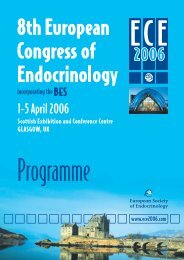
![The Endocrinologist | Issue 99 [PDF] - Society for Endocrinology](https://img.yumpu.com/48213777/1/184x260/the-endocrinologist-issue-99-pdf-society-for-endocrinology.jpg?quality=85)
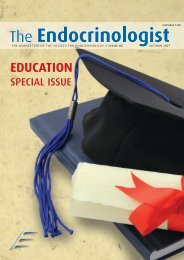
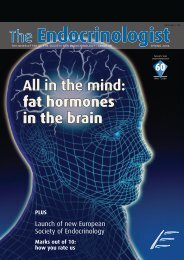
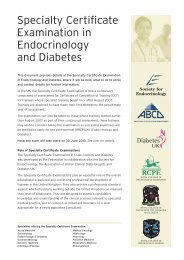
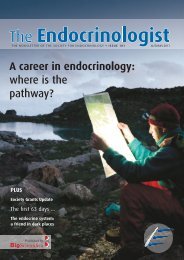
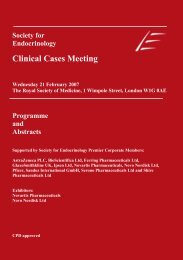
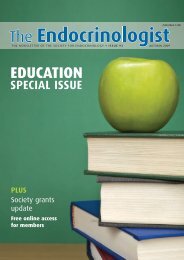
![The Endocrinologist | Issue 97 [PDF] - Society for Endocrinology](https://img.yumpu.com/40840065/1/184x260/the-endocrinologist-issue-97-pdf-society-for-endocrinology.jpg?quality=85)

